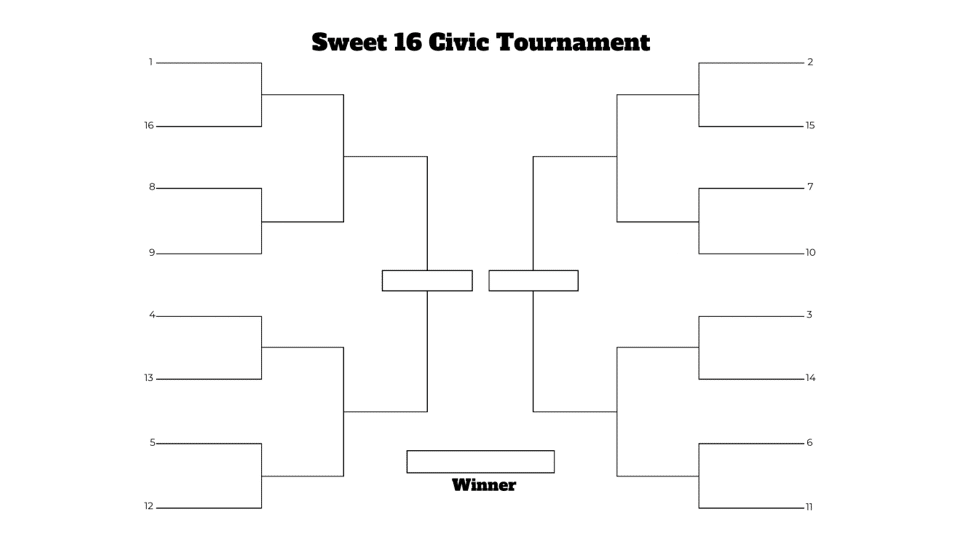Exploring Civic Passions
Dear collaborative discussion friends,
This week we are highlighting Activity 5.1 Identifying Your Civic Passion, designed to help discussion participants figure out which civic topics are of greatest concern to them as individuals and as a group. This activity uses a playful, competitive model to get groups thinking and deciding together.
Interview with Jessica Friedrichs
You can hit the play button above to listen to Jessica Friedrichs, Assistant Professor & Director of Undergraduate Social Work Field Education at Carlow University, describe how to implement this activity. This is one of many activities in the Civic Collaboration Module.
If you missed the previous newsletter about Reflecting on Social Identity in Collaborative Discussion (Identity Pie), you can access it and our other weekly newsletters by subscribing below.
This week’s activity:
Activity 5.1 – Identifying Your Civic Passion
Introducing the Civic Sweet Sixteen Brackets
This activity provides an opportunity for participants to reflect on which civic issues are most important to them individually and how they might negotiate or advocate for these issues within a larger group. Through discussion, small groups will complete a “Civic Topics Sweet Sixteen Competition” which allows for a playful but serious reflection on which topics are most important to them as individuals and as a group, and why.
Getting Started: Seed the Brackets
Participants write down civic issues that matter most to them. Each person should try to come up with at least 3-5 topics. If possible, generate this list in advance on a digital platform. Generate at least 16 topics. You may want to consolidate or combine issues where appropriate.
Next, individuals vote for their top issues. Use a rank choice voting method so that participants can vote for their top choices. For example, if doing this in-person, give each participant a marker or sticker and allow them to distribute 5 points across their top issues. They can give 1 point to 5 different topics or 5 points to a single topic. They can distribute their points however they like. Or, use a digital platform like RankIt to determine the Top 16 Civic Topics.
Load or seed the Sweet Sixteen Bracket. In true tournament form, be sure to have the topic that ranks most important to the group (#1) to face off against the topic that ranks #16. You should continue to load the bracket accordingly #2 vs. #15, #3 vs. #14, #4 vs. #13, and so on.
Next: Begin the Civic Tournament
In small groups (3-4 people), play the Sweet Sixteen Civic Tournament. Discuss the various competitions or face-offs. As a group, decide which topic will win and continue in the tournament.
Helpful prompts might include:
- If you had to devote your life (or the semester) to the issue, which one would you pick?
- If you had to convince others to join you to make a change for this area, which one would you pick?
- Why does this topic resonate with you?
- Which values are helping to inform your choice?
Tip: Participants almost always want more time during this activity. You can limit time to force a quicker deliberation and create more space for a full group debriefing about the experience (focus on process). Or, you can allocate more time for the competition to allow for deeper small group discussion and exploration of shared concerns (identifying a common topic of concern). Think about your goal as the facilitator to determine which outcome is more important for your group.
Last: Debrief about the Process
Return to a full group. Each group shares their final “winning” civic issue. Discuss:
- Was it hard for your group to reach this decision? Was it a tough competition? Which face-off was the hardest?
- How did your group decide the winner if opinions differed?
- What was the hardest aspect of this activity?
You can find detailed instructions, reflection questions, and additional resources in the full description of Activity 5.1 Identifying Your Civic Passion. It has been successfully used by student facilitators to identify the themes for campus-wide discussions. It has also been used by student teams to identify their shared capstone project, service projects, and community outreach efforts. Let us know how you use this activity to encourage deeper discussion and group decision-making.
If you try out this activity, please share with us what you think:
We hope this toolkit activity offers a fun way for discussion groups to explore what they care about and make shared decisions together. In our upcoming newsletter we will be highlighting another playful activity that helps to encourage bold imagination about futures we want to create (and how to get there).
Upcoming Events
- Mark your calendars! Our next Collaborative Discussion Project community gathering is Friday, April 14th at 2 pm (EDT). All are welcome! Register here.
- We are accepting applications for our next Collaborative Discussion Coach Training (May 31 – June 6). This training is open to anyone interested in offering certificate programs in the future. You can apply here or share this newsletter with people you think might be interested.
- We are also accepting nominations for our Pilot Coach Training for Undergraduate Students. Space will be limited. You can learn more or nominate a student by emailing me at [email protected]
Looking forward to collaborating with you this year,
Shannon Wheatley Hartman & the Collaborative Discussion Team





